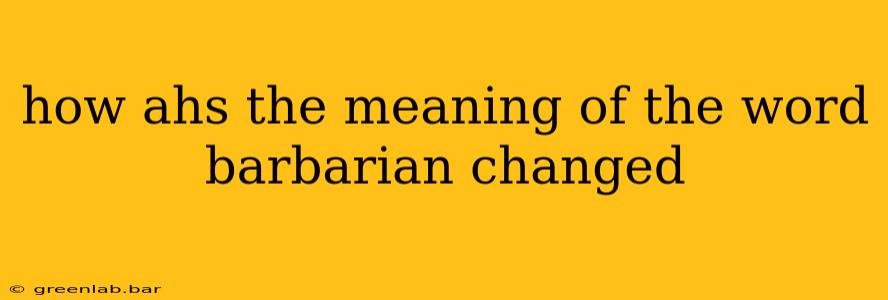The word "barbarian," now often used as a derogatory term, has undergone a significant semantic shift throughout history. Its evolution reflects changing cultural attitudes, power dynamics, and the very definition of "civilization." Understanding this transformation provides valuable insight into how language reflects and shapes societal perceptions.
From Greek Origins to Roman Expansion
The term's origins lie in ancient Greece. The word βάρβαρος (barbaros) was initially an onomatopoeic term, mimicking the perceived unintelligible sounds of foreign languages. To the ancient Greeks, anyone who didn't speak Greek sounded like they were saying "bar-bar-bar," hence the term. It wasn't inherently negative; it simply denoted those outside their cultural sphere.
The Romans adopted the term, expanding its usage to encompass various non-Roman groups across their vast empire. While initially descriptive, the Roman application of "barbarian" increasingly carried negative connotations. It became associated with perceived savagery, lack of sophistication, and a threat to Roman power and order. This shift reflected the Romans' self-perception as the apex of civilization, contrasting themselves with supposedly "uncivilized" outsiders.
Medieval and Modern Connotations
During the Middle Ages, the term "barbarian" continued to be used, often applied to Germanic tribes and other groups perceived as less "civilized" than those within the established power structures. This usage cemented the word's association with violence, lawlessness, and a lack of cultural refinement. The Crusades further reinforced this negative perception, with the "barbarians" often depicted as enemies of Christianity.
The Renaissance and Enlightenment periods saw a gradual shift, though the negative connotations largely persisted. Scholars began to examine the cultures of previously labeled "barbarians" with more nuance, recognizing their complexity and contributions. However, the term still retained a derogatory undertone, often used to justify colonization and imperialism.
The 20th and 21st Centuries: A Lingering Legacy
The 20th and 21st centuries witnessed a growing awareness of the problematic nature of the term "barbarian." Its historical association with racism, xenophobia, and cultural bias became increasingly apparent. While some might still use it in a historical context, its usage in modern discourse is largely avoided due to its inherently negative and often offensive implications. The understanding that cultural differences don't equate to inferiority has significantly contributed to the term's decline in acceptable usage.
The Ongoing Debate: Reclaiming the Narrative?
Despite the widespread understanding of its negative connotations, the term "barbarian" occasionally resurfaces in contemporary discussions. Some scholars argue for reclaiming the term, suggesting a re-evaluation that moves beyond its historically loaded context. This approach aims to deconstruct the power dynamics embedded within the term and potentially reinterpret its application. However, this remains a highly sensitive and contested area, with the majority still viewing the term as inherently problematic and offensive.
Conclusion: A Word's Evolving Shadow
The evolution of the word "barbarian" showcases the dynamic relationship between language, power, and cultural perception. Its journey from a simple descriptive term to a derogatory label reflects the shifting sands of societal attitudes. While its historical context is crucial to understand, the word's inherently negative weight makes its modern use largely inappropriate and offensive. The ongoing discussion surrounding its reclamation highlights the continuing need for sensitivity and critical awareness in the language we employ.

